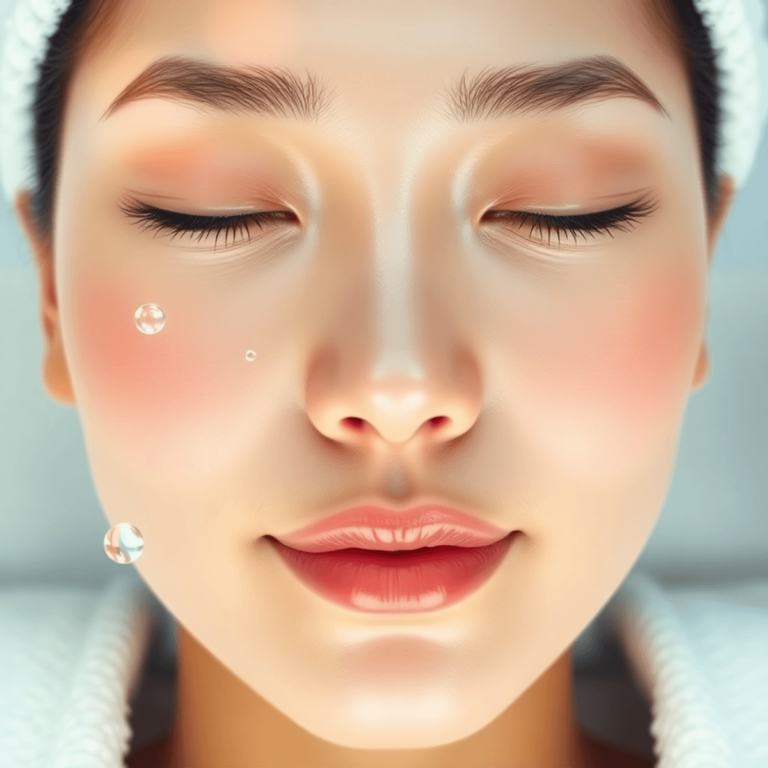Vitamin A for Hair: Experts Explain the Benefits, Best Tips, and More

Introduction
If you’re looking for ways to achieve healthy, shiny hair, you may have come across various supplements and treatments. However, have you ever thought about the benefits of Vitamin A? This essential nutrient plays a crucial role in keeping your hair healthy and full of life.
Vitamin A is more than just another supplement – it’s a vital component for promoting hair growth. Your body requires this powerful nutrient to produce sebum, a natural oil that hydrates your scalp and nourishes your hair strands.
In this detailed guide, you’ll learn about:
- The scientific explanation of how Vitamin A affects hair health
- Benefits supported by experts for promoting hair growth and upkeep
- Top food sources to increase your Vitamin A consumption
- Suggested daily intake for maximum effectiveness
- Possible risks and ways to prevent them
- Professional treatment alternatives
- Useful tips for adding Vitamin A into your hair care routine
Whether you’re experiencing hair loss, seeking to enhance your hair’s texture, or simply wanting to maintain healthy locks, knowing the significance of Vitamin A can revolutionize your hair care experience. Let’s explore the scientifically proven advantages and expert advice that can assist you in attaining the vibrant, luscious hair you desire.
Understanding Vitamin A and Its Impact on Hair Health
Vitamin A is a crucial fat-soluble vitamin that your body needs for various functions, including maintaining healthy hair. This essential nutrient exists in two primary forms:
- Retinoids – The active form found in animal products
- Carotenoids – Plant-based compounds your body converts to Vitamin A
How Your Body Processes Vitamin A
Your body processes these different forms of Vitamin A through specific pathways:
- Retinoids, derived from animal sources, directly enter your bloodstream.
- Carotenoids require conversion by your body’s enzymes before becoming usable Vitamin A.
The Role of Vitamin A in Sebum Production
The relationship between Vitamin A and hair health centers around its impact on sebum production. Your scalp contains specialized glands that produce sebum – a natural oil that:
- Moisturizes your hair shaft
- Protects your scalp from external damage
- Creates an optimal environment for hair growth
- Prevents excessive dryness and brittleness
Vitamin A regulates these sebaceous glands, ensuring they produce adequate amounts of sebum. When your body maintains proper Vitamin A levels, your scalp receives consistent moisture, creating ideal conditions for healthy hair growth.
Beyond Sebum Production: Other Ways Vitamin A Supports Hair Health
The science behind Vitamin A’s role in hair health extends beyond sebum production. This vitamin:
- Supports cell growth and differentiation
- Helps create and maintain hair follicle stem cells
- Aids in protein synthesis necessary for hair structure
- Promotes oxygen-rich blood flow to the scalp
Research indicates that Vitamin A activates specific genes responsible for initiating and maintaining the hair growth cycle. This process involves:
- Stimulating hair follicle development
- Supporting the anagen (growth) phase
- Regulating the transition between growth cycles
The Importance of Proper Vitamin A Levels for Hair Follicles
Your hair follicles depend on proper Vitamin A levels to maintain their growth cycle. Each strand of hair goes through distinct phases:
- Growth (anagen)
- Transition (catagen)
- Rest (telogen)
- Shedding (exogen)
Vitamin A helps coordinate these phases, ensuring your hair maintains its natural growth pattern. This coordination results in consistent hair growth and prevents premature hair loss.
Benefits of Vitamin A for Hair: What the Experts Say
Hair specialists and dermatologists emphasize the critical role Vitamin A plays in maintaining healthy hair. Research shows a direct link between Vitamin A deficiency and various hair-related issues.
Key Signs of Vitamin A Deficiency in Hair:
- Excessive hair shedding beyond normal daily loss
- Noticeable thinning across the scalp
- Dry, brittle strands prone to breakage
- Delayed hair growth cycles
- Dull, lackluster appearance
Dr. Sarah Chen, a leading trichologist, notes: “Vitamin A deficiency disrupts the natural hair growth cycle, pushing more follicles into the telogen (resting) phase prematurely. This results in increased shedding and visible thinning.”
Impact on Scalp Health
A healthy scalp environment serves as the foundation for strong hair growth. Vitamin A contributes to scalp health through several mechanisms:
- Regulates cell turnover in the scalp
- Supports natural exfoliation of dead skin cells
- Maintains optimal pH balance
- Prevents scalp infections
- Controls excess oil production
“The scalp is living tissue that requires proper nourishment to function optimally,” explains dermatologist Dr. Michael Roberts. “Vitamin A helps create an ideal environment for hair follicles to thrive by maintaining proper cell turnover and preventing buildup of dead skin cells.”
Follicle Nourishment
Vitamin A plays a vital role in follicle health:
- Stimulates blood circulation to hair follicles
- Promotes oxygen delivery to root cells
- Supports protein synthesis for hair growth
- Maintains follicle stem cell activity
- Prevents follicle miniaturization
Research published in the Journal of Dermatological Science demonstrates that adequate Vitamin A levels help maintain the size and activity of hair follicles, preventing premature miniaturization – a common cause of hair thinning.
Studies show that proper Vitamin A levels can help:
- Reduce excessive hair shedding by up to 30%
- Improve scalp condition within 8-12 weeks
- Enhance follicle response to other nutrients
Enhancing Hair Texture and Shine with Vitamin A
Vitamin A works as a natural hair enhancer by regulating sebum production and supporting cellular turnover in your scalp. This essential nutrient creates the perfect environment for your hair to develop a natural, healthy shine.
Here’s how Vitamin A transforms your hair texture:
- Sebum Balance: The right amount of Vitamin A helps your scalp produce the optimal amount of natural oils, creating a protective coating that makes your hair strands smooth and manageable. Incorporating jojoba oil into your routine can further enhance this effect, as it closely resembles the natural sebum produced by your scalp.
- Cellular Regeneration: Vitamin A speeds up the renewal of skin cells on your scalp, preventing buildup that can make hair appear dull. If you’re experiencing dryness or lifelessness in your hair due to environmental changes, such as moving from Florida to Colorado, it’s crucial to focus on repairing your scalp health.
- Moisture Retention: The nutrient strengthens your hair’s ability to retain moisture, reducing frizz and brittleness
Your hair’s shine factor depends significantly on its ability to reflect light. Vitamin A helps create a smoother hair surface that naturally reflects more light, giving your locks that coveted glossy appearance.
Signs of improved hair texture from adequate Vitamin A levels:
- Reduced split ends
- Smoother hair shaft
- Less tangling
- Natural glossiness
- Improved manageability
- Softer touch
The impact of Vitamin A on your hair texture becomes noticeable within a few weeks of maintaining proper levels. Your hair starts feeling silkier to touch, and you’ll notice less resistance when brushing or styling.
Tips for maximizing Vitamin A’s texture-enhancing benefits:
- Brush your hair gently to distribute natural oils from root to tip
- Use lukewarm water when washing to preserve natural oils
- Protect your hair from excessive heat styling
- Stay consistent with your Vitamin A-rich diet
Hair professionals note that combining proper Vitamin A intake with gentle hair care practices amplifies its texture-enhancing effects. This nutrient works from the inside out, creating stronger, smoother, and more radiant hair strands.
Dietary Sources of Vitamin A for Healthy Hair: Expert Recommendations
Getting your daily dose of Vitamin A through natural food sources provides the most effective way to nourish your hair. You’ll find two types of Vitamin A in foods: preformed Vitamin A (retinol) from animal sources and provitamin A (beta-carotene) from plant sources.
Animal-Based Sources
- Cod liver oil (30,000 mcg per tablespoon)
- Beef liver (6,500 mcg per 3 ounces)
- Eggs (270 mcg per large egg)
- Full-fat dairy products (200-300 mcg per serving)
Plant-Based Sources
- Sweet potatoes (1,400 mcg per 1/2 cup)
- Carrots (850 mcg per 1/2 cup)
- Spinach (570 mcg per 1/2 cup)
- Butternut squash (500 mcg per 1/2 cup)
- Red bell peppers (375 mcg per 1/2 cup)
Creative Ways to Add Vitamin A-Rich Foods
- Blend carrots and sweet potatoes into your morning smoothie
- Add spinach to your eggs or sandwich
- Snack on red bell pepper strips with hummus
- Top your salads with hard-boiled eggs
- Mix roasted butternut squash into pasta dishes
Pro Tips from Nutritionists
- Pair Vitamin A-rich foods with healthy fats to enhance absorption
- Steam or lightly cook vegetables to preserve nutrient content
- Include a variety of both animal and plant sources for optimal benefits
- Store vegetables properly to maintain their Vitamin A content
- Choose organic options when possible to minimize pesticide exposure
Your body absorbs animal-based Vitamin A more efficiently than plant-based sources. Plant sources require conversion to the active form, making it essential to consume adequate amounts of these foods. Incorporating these nutrient-rich options into your daily meals helps maintain optimal Vitamin A levels for healthy hair growth.
Recommended Daily Intake: Finding the Right Balance for Hair Health
Getting the right amount of Vitamin A is crucial for maintaining healthy hair. The recommended daily intake varies between men and women:
For Men: 900 micrograms (mcg) per day, equivalent to about 3,000 IU (International Units)
For Women: 700 micrograms (mcg) per day, equivalent to about 2,333 IU
These guidelines are set by nutrition experts and healthcare professionals to ensure optimal hair health without risking toxicity. Your body’s ability to absorb and process Vitamin A depends on several factors:
- Age
- Current health status
- Genetic factors
- Dietary habits
- Medication use
Pregnant women require special attention to their Vitamin A intake:
- Recommended daily intake: 770 mcg
- Upper limit: 3,000 mcg
The best way to meet these requirements is through a balanced diet rich in both preformed Vitamin A and beta-carotene sources. Your body naturally regulates the conversion of beta-carotene to Vitamin A based on its needs, making it a safer option compared to supplements.
Remember to track your daily intake through food logging or consulting with a registered dietitian to ensure you’re meeting these requirements without exceeding safe limits.
Risks Associated with Excessive Vitamin A Intake: What You Need to Know
While Vitamin A plays a vital role in hair health, excessive intake can trigger serious adverse effects. Your body stores this fat-soluble vitamin, making it possible to accumulate toxic levels over time.
Signs of Vitamin A Toxicity:
- Severe hair loss and thinning
- Dry, brittle strands
- Scalp irritation and inflammation
- Changes in hair texture
Beyond hair-related issues, excessive Vitamin A intake can lead to broader health complications:
Immediate Symptoms:
- Blurred vision
- Nausea and vomiting
- Headaches
- Skin peeling
- Joint pain
Long-term Health Risks:
- Liver damage
- Bone density reduction
- Birth defects during pregnancy
- Increased intracranial pressure
The risk of toxicity primarily stems from supplement use rather than dietary sources. Your body naturally regulates the conversion of beta-carotene from food into Vitamin A based on its needs. However, direct supplementation can bypass these natural controls.
High-Risk Scenarios:
- Taking multiple supplements containing Vitamin A
- Combining cod liver oil with other Vitamin A supplements
- Using high-dose retinol treatments without professional guidance
- Long-term consumption exceeding 10,000 IU daily
Medical experts recommend obtaining Vitamin A primarily through food sources. If you experience unusual hair loss or any toxicity symptoms while taking Vitamin A supplements, reduce your intake and consult a healthcare provider immediately.
Safe Supplementation Guidelines:
- Never exceed recommended daily allowances
- Choose beta-carotene forms over preformed Vitamin A
- Monitor total Vitamin A intake from all sources
- Consider potential interactions with medications
Balancing Your Intake Through a Well-Rounded Diet: Tips from Experts
A balanced diet rich in whole foods serves as your best strategy for maintaining healthy hair. Leading nutritionists emphasize the superiority of natural food sources over supplements for optimal nutrient absorption.
Best Practices for Natural Vitamin A Intake:
- Mix different colored vegetables in your meals
- Include both plant and animal sources
- Prepare foods properly to maximize nutrient retention
- Create diverse meal plans incorporating various vitamin A-rich foods
Expert-Recommended Daily Menu Ideas:
- Breakfast: Greek yogurt with diced mangoes and a handful of nuts
- Lunch: Spinach salad with grilled chicken and sweet potato cubes
- Dinner: Baked salmon with roasted carrots and quinoa
- Snacks: Red bell peppers with hummus or dried apricots
Smart Food Combinations for Enhanced Absorption:
- Pair vitamin A-rich foods with healthy fats
- Combine leafy greens with citrus fruits
- Add nuts or seeds to your vegetable dishes
Registered dietitian Sarah Thompson recommends: “Focus on creating colorful plates. The more varied your food colors, the more diverse your nutrient intake.”
Practical Implementation Tips:
- Prep vitamin A-rich vegetables in advance
- Store produce properly to maintain nutrient content
- Cook vegetables lightly to preserve nutrients
- Include at least one vitamin A source in each meal
Weekly Meal Planning Strategy:
- Plan 3-4 different breakfast options
- Rotate between various protein sources
- Include a rainbow of vegetables
- Maintain portion control for balanced intake
Dr. Michael Chen, nutrition expert, suggests: “Think of your plate as a canvas – aim for 50% vegetables, 25% lean protein, and 25% whole grains.”
Kitchen Organization Tips:
- Keep vitamin A-rich foods visible in your fridge
- Store prepared vegetables at eye level
- Label containers with expiration dates
- Maintain a shopping list of essential foods
Remember to listen to your body’s signals and adjust portions according to your individual needs. A well-planned diet provides sufficient nutrients without the risks associated with supplement overdose
Complementary Vitamins and Minerals That Work Hand-in-Hand with Vitamin A for Optimal Hair Health
Your hair’s health depends on a symphony of nutrients working together. While Vitamin A plays a crucial role, other essential vitamins and minerals enhance its effectiveness for optimal hair growth and maintenance.
1. Biotin (Vitamin B7)
- Stimulates keratin production, the protein that forms hair structure
- Strengthens existing hair strands
- Reduces brittleness and breakage
- Found in eggs, nuts, seeds, and legumes
2. Vitamin C
- Essential for collagen synthesis
- Protects hair follicles from oxidative stress
- Aids iron absorption for better hair growth
- Rich sources include citrus fruits, berries, and bell peppers
3. Vitamin D
- Research links deficiency to various forms of alopecia
- Helps create new hair follicles
- Regulates hair growth cycles
- Obtained through sunlight exposure and fatty fish
4. Vitamin E
- Balances free radicals that can damage hair follicles
- Improves scalp circulation
- Promotes hair growth and retention
- Present in almonds, sunflower seeds, and avocados
5. Iron
- Carries oxygen to hair follicles
- Prevents hair loss and thinning
- Supports healthy hair growth cycles
- Found in red meat, spinach, and lentils
6. Zinc
- Regulates oil gland function around hair follicles
- Repairs hair tissue
- Maintains protein structure
- Available in oysters, beef, and pumpkin seeds
These nutrients create a powerful support system for your hair health:
- Protein Structure Support: Biotin and zinc maintain hair’s structural integrity
- Follicle Protection: Vitamins C and E shield against environmental damage
- Growth Regulation: Vitamin D and iron ensure proper growth cycles
- Tissue Repair: Zinc and Vitamin C aid in continuous hair tissue maintenance
Your body requires these nutrients in specific amounts to maintain healthy hair growth. A blood test can reveal any deficiencies affecting your hair health. Consider tracking your nutrient intake through a food diary
Expert Tips Beyond Nutrition: Lifestyle Changes You Can Make to Support Healthy Hair Growth with the Help Of The Mighty Vitamin-A
Your hair health journey extends beyond proper nutrition. Research shows that lifestyle factors significantly impact how your body processes and utilizes Vitamin A for optimal hair growth.
Stress Management Techniques for Enhanced Hair Health
- Practice deep breathing exercises for 10 minutes daily
- Incorporate regular yoga or meditation sessions
- Take short walks during work breaks
- Try progressive muscle relaxation before bedtime
- Schedule regular massage sessions
Chronic stress triggers the release of cortisol, which can disrupt your body’s ability to properly utilize Vitamin A. This disruption affects sebum production and hair follicle health, leading to increased hair loss and slower growth cycles.
Hydration Guidelines for Optimal Vitamin A Absorption
- Start your day with a glass of water
- Track water intake using smartphone apps
- Set hourly reminders to drink water
- Keep a reusable water bottle at your desk
- Consume water-rich foods like cucumbers and watermelon
Your body needs adequate hydration to transport nutrients, including Vitamin A, to your hair follicles. Aim for 8-10 glasses of water daily to maintain proper nutrient distribution and support healthy hair growth.
Physical Activity Benefits
- Engage in moderate exercise 3-4 times weekly
- Include both cardio and strength training
- Practice gentle stretching exercises
- Join group fitness classes for accountability
- Schedule active recovery days
Regular physical activity improves blood circulation, helping deliver Vitamin A and other essential nutrients to your hair follicles. Exercise also reduces stress levels, creating an optimal environment for healthy hair growth.
Remember to maintain consistent sleep patterns and protect your hair from environmental damage. These lifestyle modifications work synergistically with Vitamin A to promote stronger, healthier hair growth.
When To Seek Professional Advice For Your Hair Concerns?
Knowing when to get professional help can make a big difference in effectively dealing with hair health problems. Here are the main signs that show it’s time to see a healthcare provider:
1. Sudden Hair Loss
Look out for these signs of sudden hair loss:
- Losing more than 100 strands per day
- Noticeable thinning in specific areas
- Bald patches appearing unexpectedly
2. Changes in Hair Texture and Appearance
Pay attention to any changes in your hair’s texture and appearance:
- Brittle or unusually dry hair that doesn’t respond to treatments
- Sudden changes in hair thickness
- Unexplained scalp irritation or inflammation
3. Physical Symptoms
Take note of any physical symptoms related to your scalp:
- Scalp tenderness or burning sensation
- Persistent itching that doesn’t improve with regular care
- Flaking or scaling that worsens despite treatment
4. Other Warning Signs
Be aware of other warning signs that may indicate a need for professional help:
- Hair loss accompanied by other health changes
- Failed attempts at self-treatment for 2-3 months
- Family history of pattern baldness with early signs appearing
A healthcare professional can perform necessary tests to determine if your hair concerns are related to vitamin A deficiency, hormonal imbalances, or other underlying health conditions. They can also evaluate your current vitamin A intake and adjust it based on your specific needs.
Remember that early intervention often leads to better outcomes, particularly when dealing with vitamin-related hair issues. Professional guidance can help prevent further damage and create an effective treatment plan tailored to your specific situation.
Potential Treatment Options Available Through Healthcare Providers
Healthcare professionals offer a range of scientifically-backed treatments for hair-related concerns. Here’s what you can expect when seeking medical intervention:
1. Prescription Medications
- Topical Minoxidil: Available in different strengths, this FDA-approved treatment stimulates hair follicles and prolongs the growth phase
- Finasteride: An oral medication that blocks DHT production, particularly effective for male pattern baldness
- Spironolactone: Prescribed to women with hormone-related hair loss
- Dutasteride: A stronger alternative to finasteride for severe cases
2. Advanced Treatment Options
- Platelet-Rich Plasma (PRP) therapy
- Low-level laser therapy
- Hair transplant surgery
- Scalp micropigmentation
3. Personalized Treatment Plans
Your healthcare provider will create a tailored solution based on:
- Medical history
- Type of hair loss
- Underlying health conditions
- Hormone levels
- Current medications
- Lifestyle factors
4. Diagnostic Tools
Healthcare providers use specialized equipment to assess your condition:
- Scalp microscopy
- Blood tests for nutritional deficiencies
- Hormone level analysis
- Scalp biopsy (in rare cases)
5. Combination Approaches
Many providers recommend multi-faceted treatment plans that include:
- Prescription medications
- Dietary modifications
- Lifestyle adjustments
- Specialized hair care products
Remember: Self-diagnosis can lead to inappropriate treatment choices. A qualified healthcare provider will consider your unique circumstances, monitor your progress, and adjust treatments as needed for optimal results.
Conclusion: Embrace The Power Of Vitamin A For Luxuriously Healthy Hair!
Your journey to healthier, more luxurious hair starts with understanding the vital role of Vitamin A. This powerful nutrient works alongside other essential vitamins and minerals to create the perfect environment for hair growth and maintenance.
The path to optimal hair health includes:
- Balanced Nutrition: Incorporate Vitamin A-rich foods into your daily meals while maintaining proper intake levels
- Smart Supplementation: Work with healthcare providers to determine if supplements are necessary for your specific needs
- Stress Management: Practice relaxation techniques to minimize the impact of stress on your hair health
- Proper Hydration: Drink adequate water throughout the day to support scalp health
- Regular Monitoring: Pay attention to changes in your hair’s condition and seek professional guidance when needed
Remember – achieving healthy hair isn’t about quick fixes or isolated solutions. It’s about creating a sustainable routine that nourishes your body from within. By combining proper nutrition with mindful lifestyle choices, you’re setting yourself up for success in your hair health journey.
Your hair deserves the best care possible, and now you have the knowledge to make informed decisions about your Vitamin A intake and overall hair care routine. Take these insights and transform them into action – your future self (and your hair) will thank you.
FAQs (Frequently Asked Questions)
What is Vitamin A and how does it impact hair health?
Vitamin A is a fat-soluble vitamin that exists in two primary forms: retinoids and carotenoids. It plays a crucial role in supporting sebum production, which is essential for maintaining a healthy scalp and promoting hair growth.
What are the benefits of Vitamin A for hair?
Vitamin A helps prevent hair loss by maintaining scalp health and nourishing hair follicles. Adequate levels of this vitamin can also enhance hair texture and shine, contributing to smooth and lustrous locks.
What are some dietary sources of Vitamin A that can support healthy hair?
Foods rich in Vitamin A include sweet potatoes, carrots, and spinach. Incorporating these foods into your diet can help ensure you receive adequate amounts of this vital nutrient for optimal hair health.
What is the recommended daily intake of Vitamin A for men and women?
The recommended daily intake of Vitamin A is 900 mcg for men and 700 mcg for women. Maintaining these levels supports optimal hair health along with overall well-being.
What are the risks associated with excessive Vitamin A intake?
Excessive consumption of Vitamin A can lead to toxicity, resulting in negative effects on hair health such as hair loss, along with other potential health concerns. It’s important to balance your intake to avoid these risks.
When should I seek professional advice for my hair concerns?
You should consult a healthcare professional if you experience significant hair loss or drastic changes in your hair’s condition. Recognizing these indicators early can help address underlying issues effectively.










